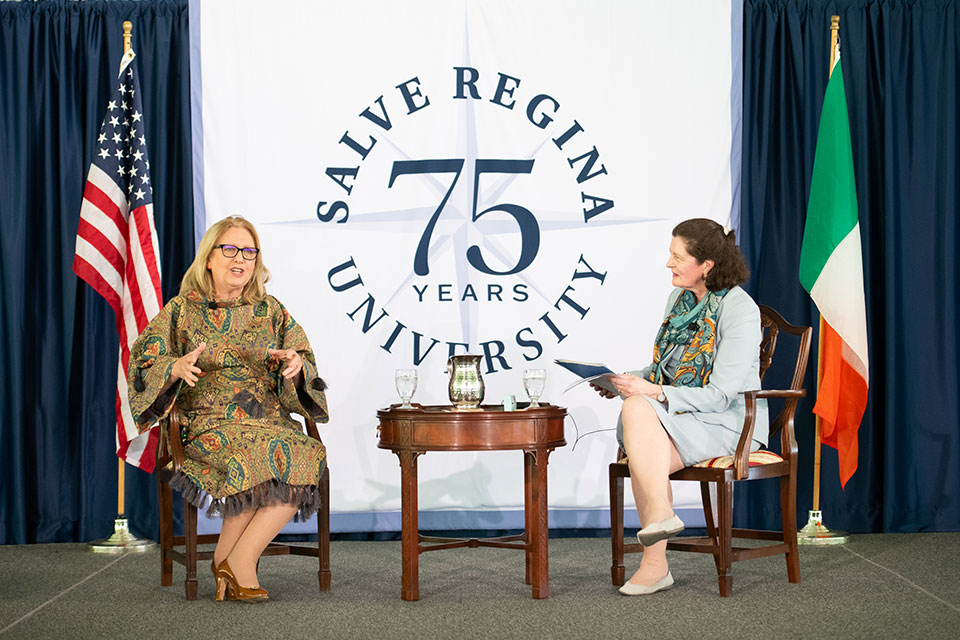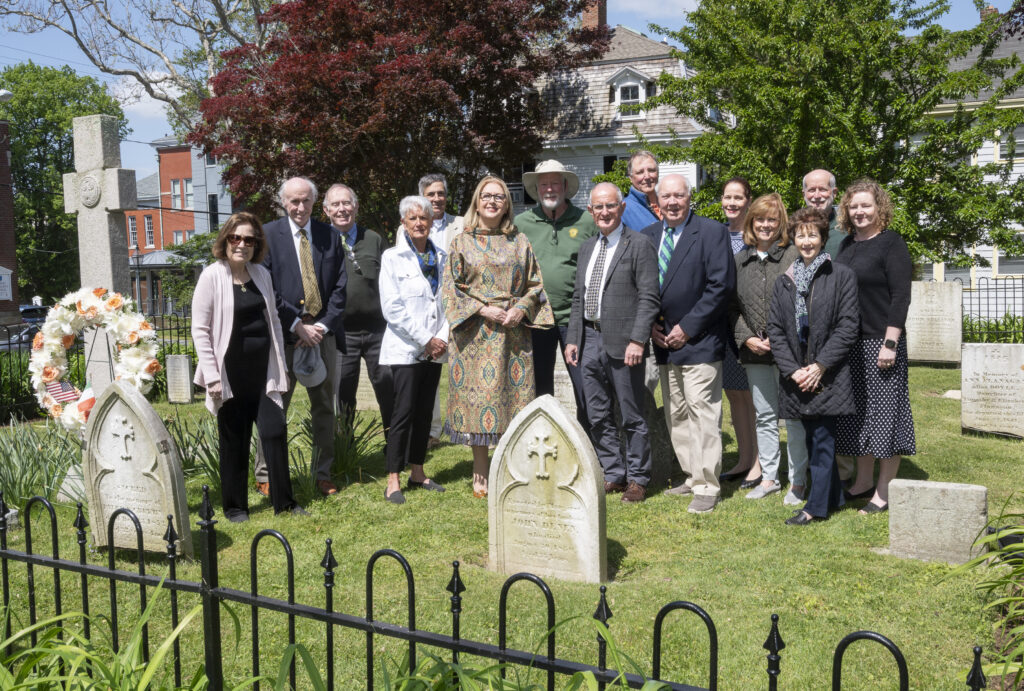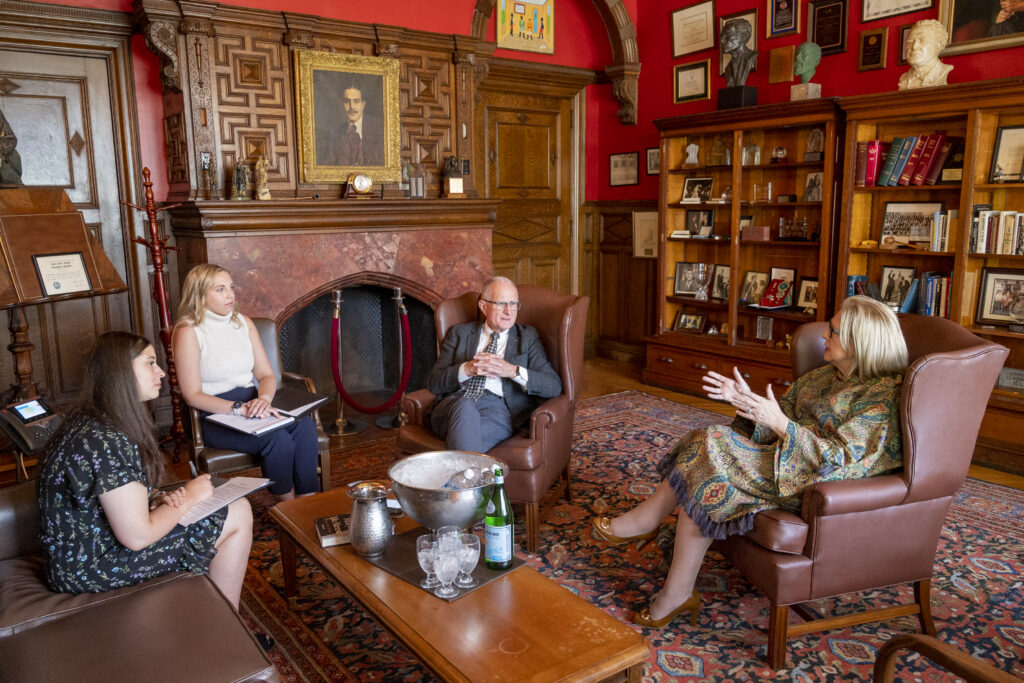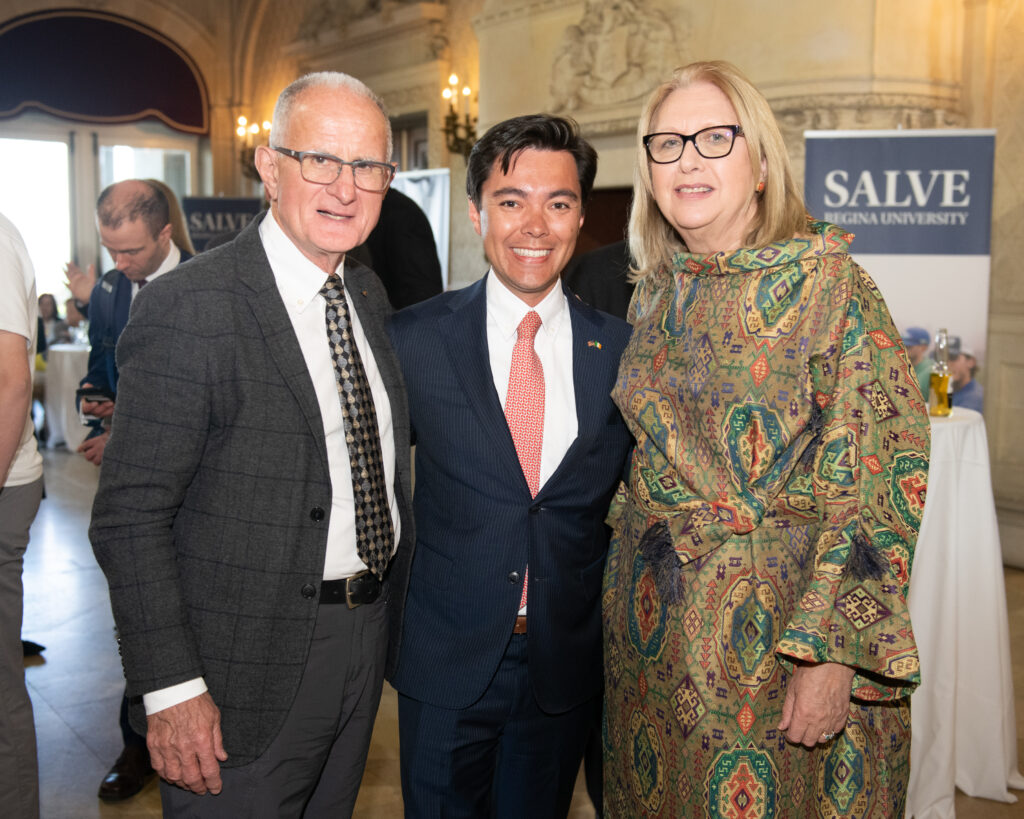Mary McAleese, former president of Ireland, delivers hopeful message during first-ever trip to Newport

Mary McAleese, Ireland’s eighth president who served two full terms from 1997 to 2011, delighted an audience of about 750 people with poignant tales of family, war, peace, politics and more during an hour-long conversation with Dr. Kelli J. Armstrong, president of Salve Regina, on Wednesday, May 17.
McAleese was making her first visit to Newport, Rhode Island, and she was accompanied by her husband, Martin McAleese.
The event was one of several the University staged throughout the 2022-23 academic year to commemorate the 75th anniversary of its founding by the Sisters of Mercy in the tradition of Catherine McAuley, who opened the first House of Mercy on Baggot Street in Dublin, Ireland, in 1827.
The Sisters of Mercy were the first religious sisters who were not cloistered but instead walked alongside the poor, supporting particularly the women and children on the streets of Dublin.
“As we thought deeply about who would best represent our mercy ideals of faith, of social justice, of service, and also our special relationship with Ireland, we could think of no better person than Mary McAleese,” Dr. Armstrong said in her welcoming remarks.
The audience included Xaykham Khamsyvoravong, the mayor of Newport, and members of the city council, as well as Claudia Fritsche, Liechtenstein’s first ambassador to the United Nations and the U.S.

The morning of May 17, McAleese attended the historical site of Barney Street Cemetery with Museum of Newport Irish History board members.
Also attending were Salve Regina trustees; a delegation from the Sisters of Mercy that included two former Salve Regina presidents, Jane Gerety and M. Therese Antone, who is also currently chancellor at Salve Regina; and leadership from several universities and colleges in New England — including Wheaton College, Johnson & Wales University and Rhode Island College. Many representatives from local American Irish groups were also in attendance.
During her tenure as Ireland’s president, McAleese, the first person hailing from Northern Ireland to serve in the role, signed the historic Good Friday Agreement in 1998 and hosted the first state visit to Ireland by a British monarch, Queen Elizabeth II, in 2011.
When asked what drew her to public service, McAleese talked about her upbringing in Belfast.
“Belfast has hit the headlines over most of the years of my life for all of the wrong reasons, for very serious sectarian conflict but also a climate in which Protestants, notionally Christians, and Catholics, notionally Christians, who believe in the same Christ and the same God basically didn’t get along,” she said. “And they had different ambitions for the place they lived in.”
People adapt to conflict and tension, McAleese said. Some regrettably became militant, joining terrorist organizations while others simply got on a boat and left the country.
“I chose a different path,” she said.
Fortunately, McAleese said she married a man who felt the same, Martin McAleese, and together they formed a political affiliation that would center itself around the great Christian commandment to love one another.
“I know it sounds cheesy,” McAleese said. “We then dedicated our lives, particularly when I was elected, to doing what we think is the right thing to do, which is building bridges.”

During her visit on May 17, McAleese gave an oral history interview with students from Salve Regina, which was supported by a Claiborne Pell Fellowship Fund, in the Young Building at the University.
Today, it has been 25 years since the landmark peace accord, the Good Friday Agreement, was adopted, and McAleese, who signed the international treaty in 1998, reflected on its legacy. She said it was critically important not just to draft it as a political document but to put it to the people, north and south.
“When the people spoke almost above the voices of the politicians, there was a greater goodness that got released by the Good Friday Agreement,” McAleese said. “The realization that almost everybody around you was saying ‘yes’ to a future based on partnership, on parity of esteem, on respect for difference …. Everybody had to give a little. You can’t change without compromise, and people were willing to do that.”
McAleese put the concept of building what she calls good neighborliness to the ultimate test when she helped orchestrate the visit of Queen Elizabeth II to Ireland, something she had been working on for 16 years.
“The last time a monarch had stepped foot in Ireland was 1911,” McAleese said, explaining the relevance of the Queen’s visit. “There were very good reasons for that.”
Criticized by many and applauded by others, planning Queen Elizabeth’s visit was delicate, but McAleese quickly realized she was talking to a woman of great faith who wanted to come to make her contribution to peace.
“She came, and in four days she won the Irish people over,” McAleese said. “She came as a pilgrimage for reconciliation. I was so grateful.”

At a reception after the conversation, husband Martin McAleese (left) and Mary McAleese (right) met Xaykham Khamsyvoravong, the mayor of Newport.
During her visit, Queen Elizabeth made deeply meaningful gestures like flying into Sir Roger Casement Aerodome, bowing her head in homage at the Garden of Remembrance, visiting Croke Park — which was the site of the November 1920 Bloody Sunday massacre — and giving a speech using five words in the Irish language.
McAleese also talked about her Catholic faith amidst her criticisms of the church for what she calls its dark history of cultural colonization, of child sexual abuse, and of its treatment of women and the LGBTQ+ community. She expressed a great deal of hope for the institution’s future.
“It is the single biggest NGO in the world, bar none,” she said of the Catholic church. “What infuses that NGO work – it’s not actually the curial officials and the magisterium and the documents and canon law. It’s people like the mercy nuns who do the work. It’s people like the mommies and daddies who invest in their children and make them good people, want to make them principled people. It’s the people on the ground who do that work.”
The dark side of the Catholic church breaks her heart, she said. “But somewhere in all of that story, I think we can rescue love,” she added. “I think the people of God, particularly in this generation, are making it clear that they want to be part of a big human family.”
Watch the full talk below.

